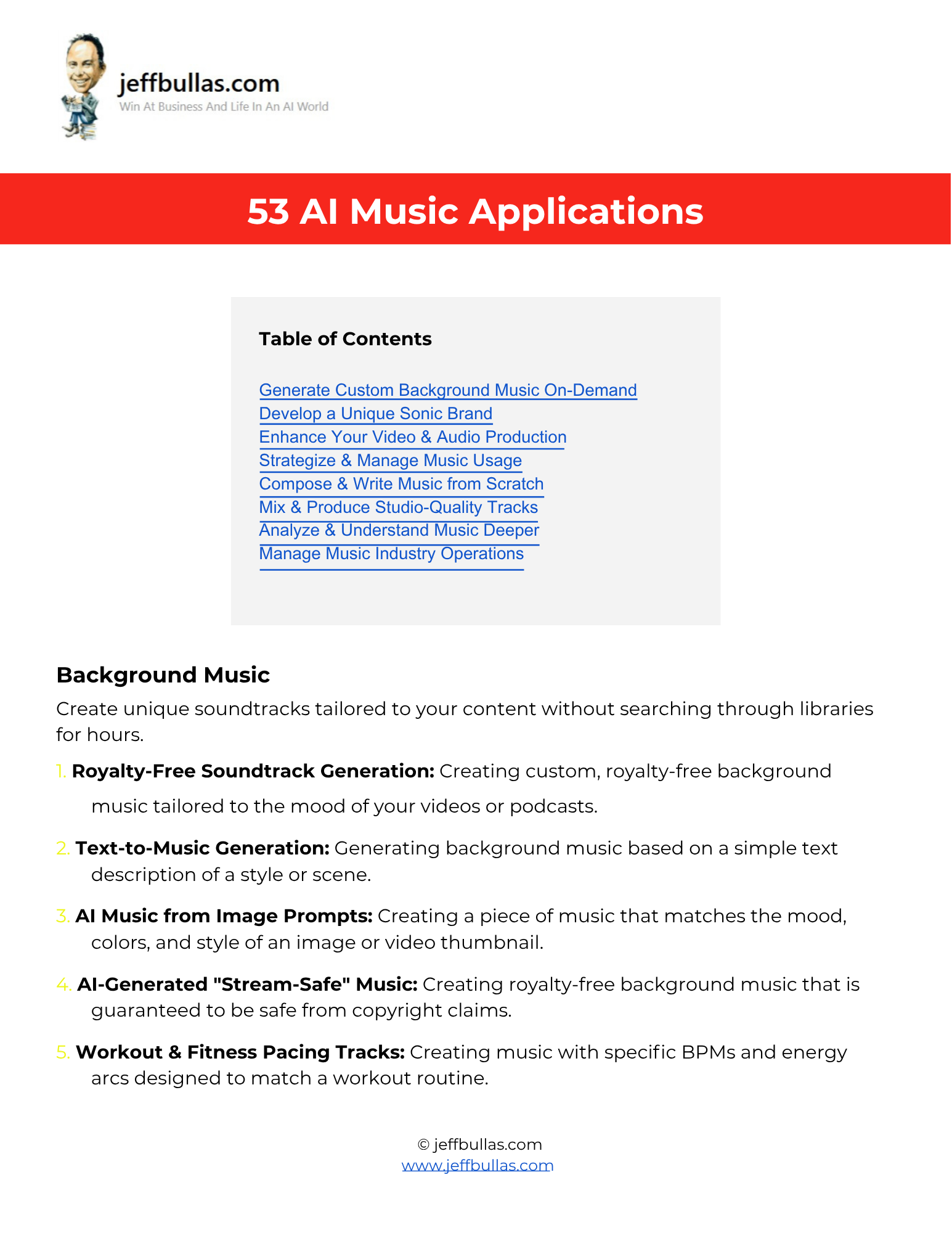
Log in or create a free Jeff Bullas account to download this file.
This resource provides a list of 53 AI music applications across content creation, production, and business operations. It helps you discover how to use AI to generate custom music, enhance your productions, and make smarter strategic decisions.
A List of AI Music Applications
This list of AI music applications is a practical resource that demonstrates the various ways artificial intelligence can be used to generate, produce, and manage music. Its main purpose is to provide a wide range of applications so you can identify the best ways to integrate AI into your content, brand, and creative workflow.
Applications in content creation and branding
AI can be used to create custom, royalty-free background music that is tailored to the mood of your videos or podcasts. You can generate music from a simple text description or even from an image prompt to match its style. AI can also help establish a memorable audio identity for your brand by automatically generating short, catchy jingles or a unique “sonic logo”.
Applications in music composition and production
For creators, AI can serve as a creative partner by generating original melodic lines, suggesting harmonically pleasing chord progressions, and creating unique drum patterns. It can also assist with lyric writing by generating ideas or entire verses based on a theme. In production, AI tools can automatically set levels and effects for your tracks, perform detailed vocal pitch correction, and even suggest technical parameters for effects to shape the sound of instruments.
Applications in music strategy and business
AI can help you make smarter decisions about the music you use by recommending licensed tracks that fit a specific mood or by identifying trending music on social media platforms. It can also analyze a competitor’s content to report on their music style. For the music industry, AI can analyze streaming data to identify promising unsigned artists, suggest music from a library for use in TV shows or ads, and even track music usage across platforms to ensure proper royalty payments.
How this AI music applications list helps you apply the information
This resource, provided as an editable Google Doc, acts as an idea bank to help you leverage AI in your creative and business projects. By reviewing the list of applications, you can discover new tools and techniques to generate custom soundtracks, improve your production quality, and make data-driven decisions about your music strategy.
Who is this AI music applications list perfect for?
This list is perfect for content creators, musicians, producers, and marketers who want to explore the potential of AI in their work. It provides valuable insights for anyone looking to create custom music, streamline their production process, or understand the business applications of AI in the music industry.
Concluding thought
By leveraging the applications in this list, you can unlock new creative possibilities, enhance the professional quality of your audio, and make more strategic use of music in your content and brand.
How to Use This
- Make Your Own Editable Copy:
- Open the link provided to access the master Google Doc.
- Once the Google Doc is open, navigate to the menu: File > Make a copy.
- A dialog box will appear. You can rename your copy if you wish and choose where to save it in your personal Google Drive.
- Click “Make a copy.” This action saves an editable version of the document to your Google Drive.
- Using Your Application List:
- Review the different categories (e.g., Background Music, Music Composition, Music Business) to find applications relevant to your goals.
- Choose a specific use case from the list that you want to explore further.
- Use the selected idea as a starting point to research specific AI music tools and integrate them into your workflow.
Frequently Asked Questions
How can AI help me create background music for my videos?
AI can generate custom, royalty-free background music tailored to the mood of your content. You can generate music from a text prompt describing a style or scene, or even from an image to match its mood.
Can AI help me write a song?
Yes, AI can act as a creative partner by generating original melodies and hooks, suggesting chord progressions, and even assisting with lyric writing by generating ideas or rhyming schemes based on a theme.
What are some ways AI can improve the quality of my audio recordings?
AI can automatically master your audio tracks to sound professional, perform detailed note-by-note vocal pitch correction, and even remove vocals from existing songs to create instrumental tracks.
How can AI be used in the business side of the music industry?
AI can analyze streaming and social media data to identify promising unsigned artists for record labels, suggest music for use in movies or TV shows, and automatically track music usage to ensure proper royalty payments.
Can I use AI to analyze music?
Yes, AI can listen to played music and automatically notate it into sheet music, analyze a song to classify its genre and mood, or suggest new songs and artists that have a similar sound to music you already like.
How can I get “stream-safe” music for my content?
You can use AI to generate royalty-free background music that is guaranteed to be safe from copyright claims on streaming platforms.
What is a “sonic logo”?
A sonic logo is a unique, short, and catchy sound or jingle that represents your brand. AI can be used to automatically generate these for your business.
